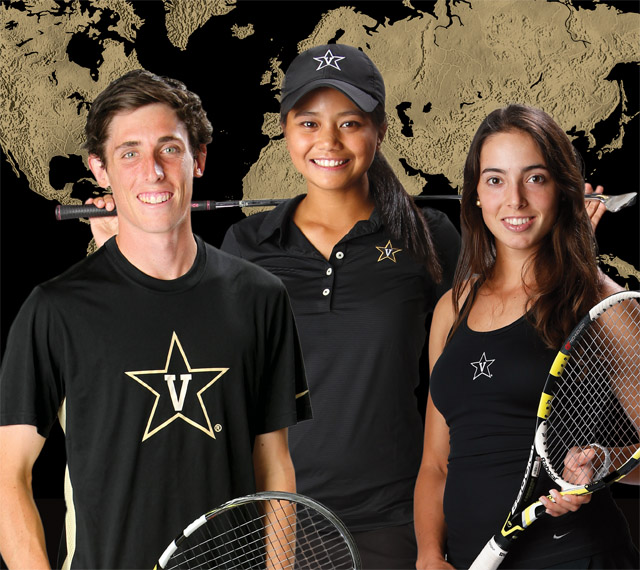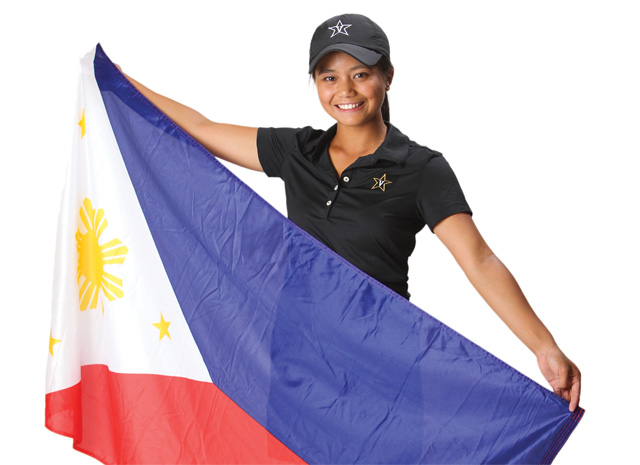Nov. 20, 2013
By Jerome Boettcher | Commodore Nation

Handshakes no longer baffle Marie Casares, even if she doesn’t quite grasp the purpose of the gesture.
She prefers a kiss on the cheek when meeting a new person or greeting an old friend. But the junior from Ecuador on Vanderbilt’s women’s tennis team is willing to embrace these foreign customs that come with living in America.
“Sometimes they shake hands from really far away,” Casares said. “I’ve always felt like I had something they didn’t like or they didn’t want to get close to me. I always had that idea of, `OK I’m not a strange creature. Give me a hug and that will be fine.’
“I feel like the same rules or agreements of respect and etiquette follow in all the countries. That is what I realized when I told my mom there is not a lot of Latin American people (at Vanderbilt). But they are still people.”
Casares is not alone in adjusting to life in the United States. Of Vanderbilt’s 340 student athletes, 13 hail from 12 countries outside of the U.S. They span six continents and include Australia, Austria, Cameroon, Canada, China, Colombia, Ecuador, Germany, Greece, Nigeria, the Philippines and Scotland.
Of the school’s 15 intercollegiate sports, seven boast international representation. The women’s golf and women’s tennis teams reflect the diverse cultural makeup of their sports with three foreign student-athletes on each roster. Men’s basketball, men’s cross country, football, men’s golf, women’s soccer and men’s tennis (two) have also recruited worldly talent.
“College athletics in America is probably ahead of the pack when it comes to playing sports,” said Australian Rhys Johnson of the men’s tennis team. “So it seemed like a pretty smart idea to come to Vanderbilt, with such an academic school, as well as play sports at a really high level. It seemed like a no-brainer for me to try and come.”
Before arriving at Vanderbilt in 2007, women’s golf coach Greg Allen never went overseas to recruit. Now, more than a quarter of his 11-player team is international, with Simin Feng (China), Antonia Scherer (Germany) and Irina Gabasa (Philippines). All three made their respective national teams before coming to Vanderbilt.
Thirty-three American college coaches, including Allen, were in Sweden in July to watch the European Girls’ Team Championship. The previous year, assistant coach Holly Clark discovered Scherer at the same event in Germany.
“I’d like to have American players on our team but we want to have the best players possible,” Allen said. “I feel like the international teams have it going on right now with the federations and the amount of support they’re getting from their governments.”
As they venture to a new country, Vanderbilt’s international student-athletes juggle new freedoms, shore up their English, battle homesickness and try to keep up with the demanding expectations in the classroom.
Men’s tennis coach Ian Duvenhage knows how they feel.
He took a huge leap more than 30 years ago when he left his hometown of Kuruman, South Africa for a tennis scholarship at the University of Miami.
“Honestly it is hard for me to articulate what the adjustment was like because I think I was a little shell shocked,” Duvenhage says now.
Though he grew up speaking his native language of Afrikaans, he also wrote, read and spoke English. But when he arrived in the U.S., he struggled to understand American accents.
He picks up on warning signs with his athletes, noting if they’re struggling in one area (athletics, academics, socially) they’re probably having difficulty in another. He consults with assistant coach Jamie Hunt, academic counselors and strength and conditioning coaches to keep tabs.
“Sometimes they are homesick and they don’t think it is particularly macho to say I’m homesick,” he said. “But it is something that all of us have struggled with on occasion. So you just have to get it out in the open and talk about it. Usually whatever the issue is if you can talk about it that really makes things better.”
Free international text messaging and apps have made it easier to get a hold of family and friends back home. But getting back there is less frequent, with most international student-athletes heading home for Christmas and summer breaks.
Casares has found a confidant in Gabasa, her roommate, and one to speak Spanish with in Vince Conde, a junior on the baseball team who was born in Puerto Rico.
Being on a team pushes Gabasa out of her comfort zone, though she hasn’t struggled to jump time zones.

With just three golf courses on her native island of Cebu, Gabasa grew up traveling for competition. Her passport is filled with stamps from China, Hong Kong, New Zealand and Australia. This summer, she joined 20 other Vanderbilt student-athletes on a eye-opening service trip to Tanzania where they distributed shoes in conjunction with Soles4Souls.
“I was shy. When I got here I was forced to meet new people and learn the culture here,” she said. “People here are not very shy. That has helped me open up a lot.”
Johnson has found a friend in fellow Aussie Astra Sharma, a freshman on the women’s tennis team. The two actually went to the same high school in Perth, the capital and largest city of the Australian state of Western Australia.
“Homesickness comes but when you have lots of people to talk to you can work through it,” Johnson, a sophomore, said. “It’s not like you just want to pack up your bags and leave. You can get through it. Adjusting to the lifestyle basically just takes time.”
Nikolaos Gkotsis continues to adapt to his first taste of America.
The freshman from Athens, Greece arrived in the country for the first time in August. Despite being a three-time national champion in the 800- and 1,500-meter runs, academic exploits, not athletic endeavors, led the 19-year-old to Vanderbilt, where cross country is a non-scholarship sport and there is not a men’s track and field program.
His father, who died in 2004, attended Columbia University and always preached to his children the value of an American education (Gkotsis’ sister is a senior at Yale). Gkotsis searched schools on the Internet and, with help from college counselors, found a perfect match in Vanderbilt.
“The level of education is so much higher than most countries in the world,” he said. “My father always told me how better things are here. … I was just hoping for the best. Until now it hasn’t let me down, so I’m pretty happy.”
One thing all international students can bond over is their longing for home-cooked meals.
Rice is second to only corn as the most widely produced grain in the world, and Casares and Gabasa are used to it accompanying every meal. They do their best to replicate that part of their lifestyle as Gabasa has a rice cooker in her dorm room.
Still, it’s not quite the same.
“Sometimes it can get a little dry, and that’s when I miss my home-cooked rice,” Casares said. “It is the one thing you always have. Not the gourmet dishes or anything. A little everyday thing.”
Gkostsis misses pasticcio, a baked pasta similar in appearance to lasagna. Johnson hasn’t found his guilty pleasure either.
Meat pies, beef or lamb cooked inside a pastry, haven’t made their way across the ocean–or at least in the kitchens of Nashville–from Australia, New Zealand and parts of Europe.
“I don’t understand why America doesn’t have them. I miss those so much,” he said. “The fact that I can’t just go and buy one is by far one of the most depressing things about being here. Someone should definitely get on it in America. It is a genius idea and they’re just so good.”
Of course, when they’re not competing, their plates are full with classes.
Casares is studying civil engineering. Johnson is an economics major. Gabasa created a major–international economics, which could tie in with her parents’ business of exporting furniture.
With such majors, balancing being a student-athlete is challenging for anybody, let alone someone living in a foreign country. Luckily, they’re not alone.
“You just have to trust yourself and trust what you’ve researched,” Johnson said.
“You have to make a family while you’re over here.”
| International Student-Athletes | ||
| Caleb Azubike | Football | Nigeria |
| Pen Binet | Men’s Tennis | Canada |
| Marie Casares | Women’s Tennis | Ecuador |
| Simin Feng | Women’s Golf | China |
| Irina Gabasa | Women’s Golf | Philippines |
| Nikolaos Gkotsis | Cross Country | Greece |
| Lina Granados | Soccer | Colombia |
| Rhys Johnson | Men’s Tennis | Australia |
| Antonia Scherer | Women’s Golf | Germany |
| Matthias Schwab | Men’s Golf | Austria |
| Georgina Sellyn | Women’s Tennis | Scotland |
| Astra Sharma | Women’s Tennis | Australia |
| James Siakam | Men’s Basketball | Cameroon |


